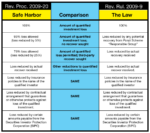Offer in compromise can help deal with IRS woes
There is one creditor that is often not put off even by bankruptcy – the IRS.
By Richard S. Lehman, Esq., of Richard S. Lehman P.A.
Published: South Florida Business Journal
Whether it is individuals who have not filed their income tax returns for years and wish to get clean or taxpayers who filed tax returns and just did not have the money to pay, there is a way out: the offer in compromise.
An offer in compromise is a contractual agreement between the IRS and a taxpayer that permits a taxpayer to pay a specific amount in full settlement of tax liabilities, including interest and penalties. This author has found that the IRS deals with these offers in a businesslike and at times humanistic way.
IRS policy acknowledges that the “acceptance of an adequate offer will result in creating for the taxpayer, an expectation of and a fresh start toward compliance with all future filing and payment requirements.” In addition to the tax liability, the penalty and interest liabilities can be established by an offer in compromise.
The IRS has three grounds in considering an offer in compromise: doubt as to liability; doubt as to collectibility; and to”promote effective tax administration.”
Offers involving doubt as to liability are relatively infrequent. Generally, the IRS does not consider an offer in compromise as a substitute for the normal procedures to determine tax liability. However, if the doubt as to liability is supported by evidence, it will be given consideration and a compromise amount can be reached.
After the taxpayer’s liability has been established by a court judgment, there can be no doubt as to liability.
It would also be misleading for the taxpayer to think that promoting effective tax administration is an easily available remedy. IRS regulations use as examples of a basis for compromise the most dire of circumstances, such as a taxpayer unable to earn a living because of a long-term illness, medical condition or disability, and expectations that the taxpayer’s financial resources will be exhausted providing for care and support. Another example is the taxpayer has assets, but will be unable to pay for basic living expenses if those assets are sold to pay outstanding tax liabilities.
Most offers in compromise are based on doubt as to collectibility and the taxpayer’s inability to pay the full tax liability. The IRS policy views an adequate offer as one that will result in a collection of the amount of tax potentially collectible at the earliest point in the collection process and at the least cost to IRS.
An offer based on doubt as to collectibility must be accompanied by an IRS full financial disclosure form. A taxpayer has three options for paying the amount of the compromise offer.
Generally, collection will require payment of cash in the amount of the offer within 90 days. When the circumstances warrant it, however, collection can also accept a short-term deferred offer that is paid within two years or, under appropriate circumstances, more than two years.
In addition to amounts paid or payable under an offer in compromise, the IRS may use a collateral agreement that asks the taxpayer to agree either to pay additional amounts from future income or to forego present or future tax benefits
There are certain parameters at various IRS review levels that may prevent a revenue agent from agreeing to what seems to be a very logical settlement with a taxpayer. It is extremely important to frame one’s offer in compromise in a manner that is not only realistic under the circumstances, but also in a manner that is sensitive to the limits imposed by the IRS parameters.
Richard S. Lehman is a principal in the Boca Raton-based law firm of Richard S. Lehman and Associates, P.A. For more information, call (561) 368-1113 or visit www.lehmantaxlaw.com.







